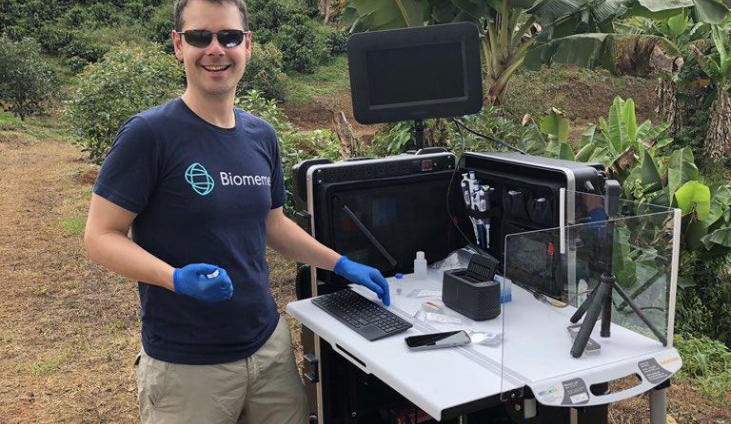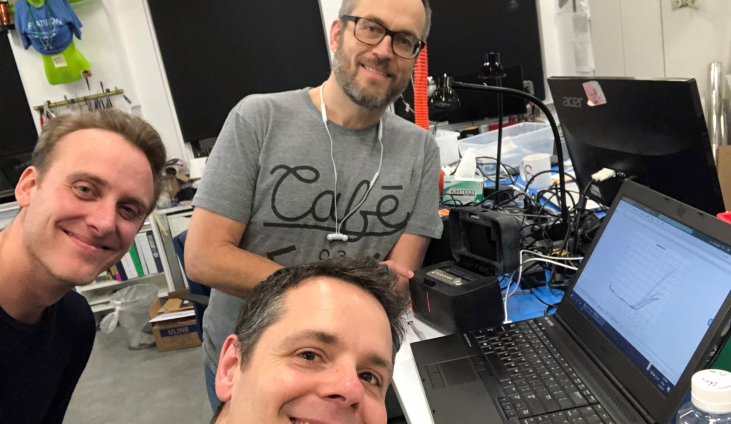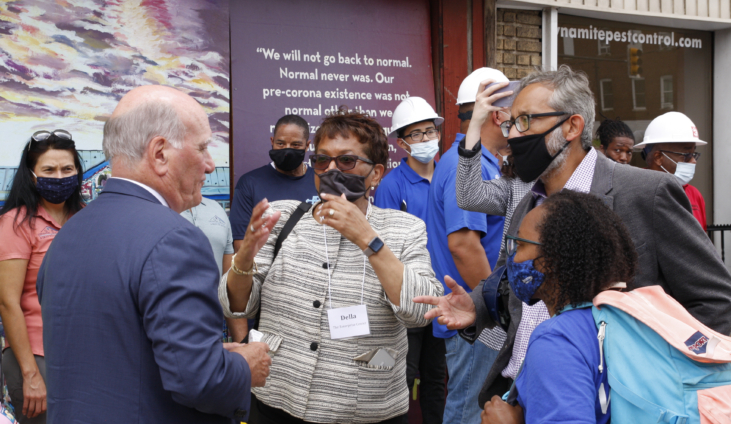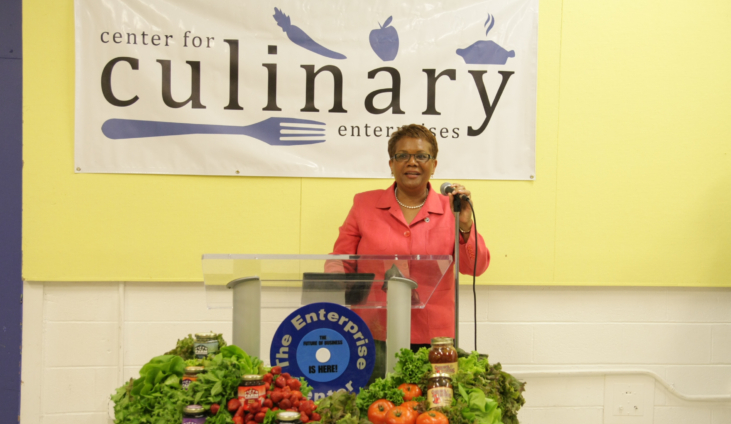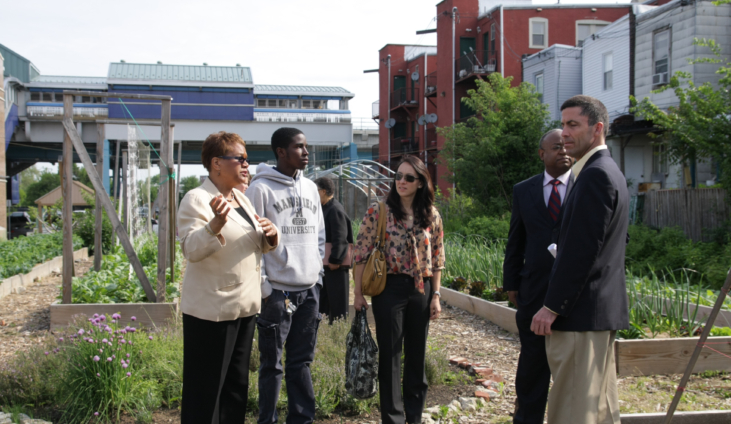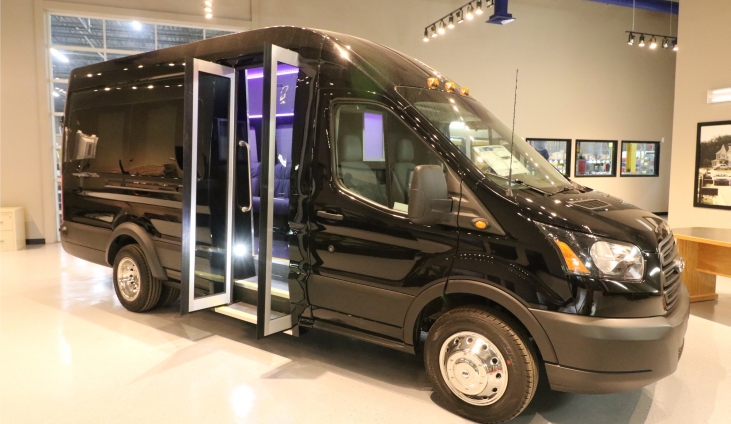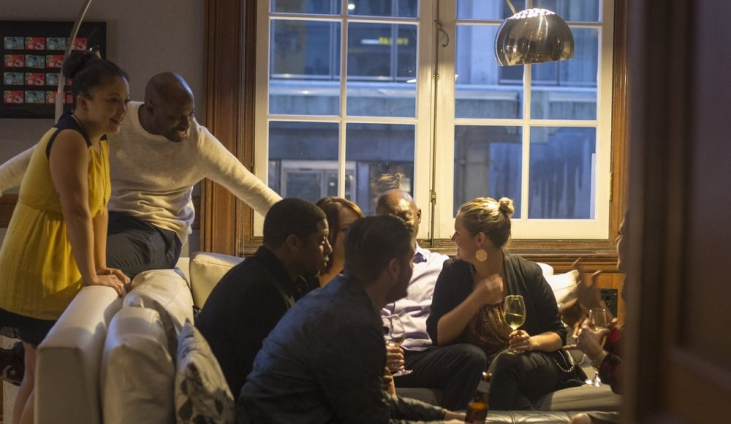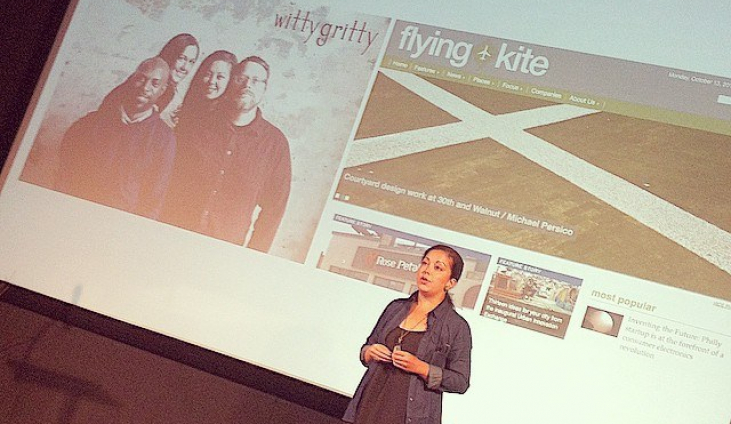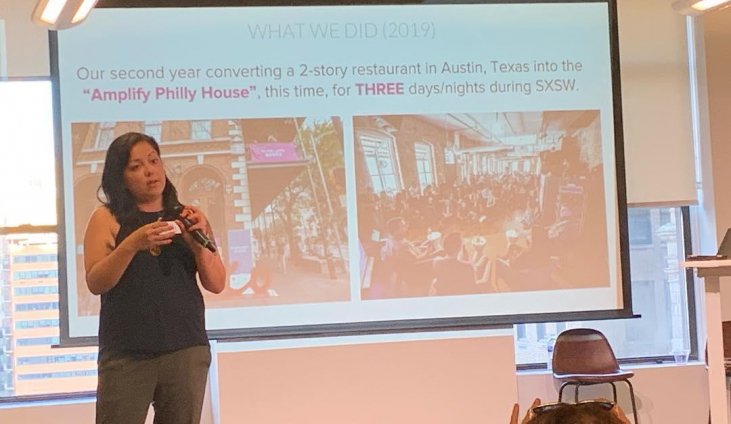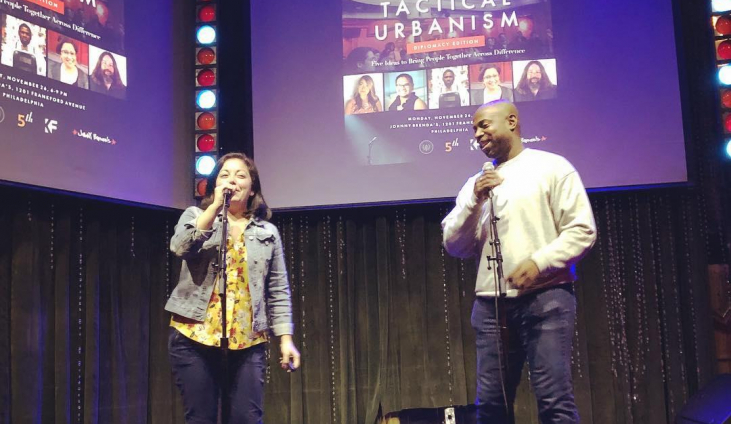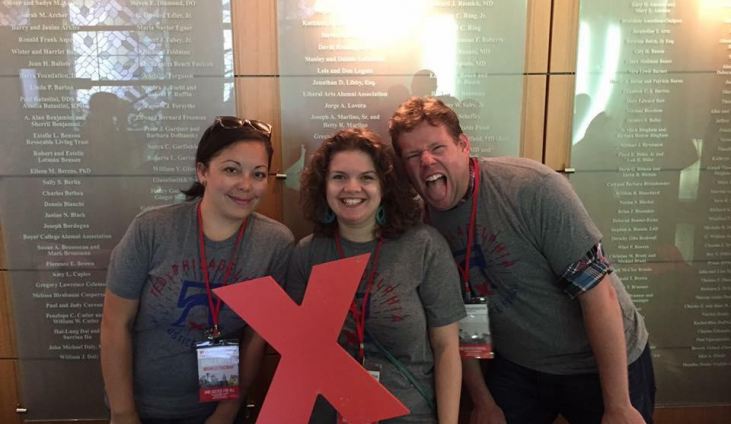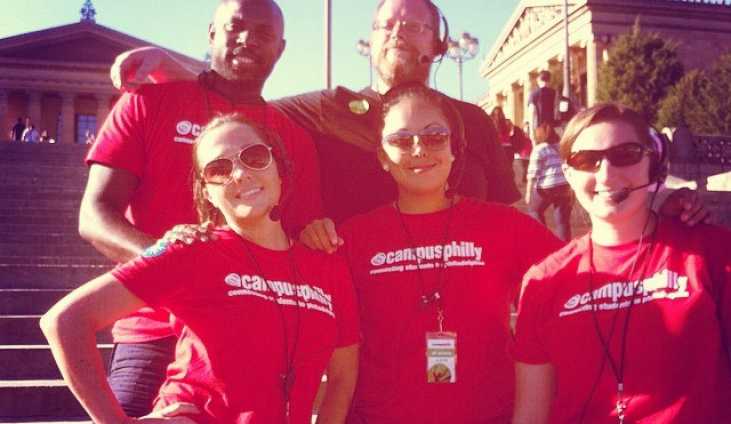This year we are humbled to present awards to Max Perelman of Biomeme, Della Clark of The Enterprise Center, Tracey Welson-Rossman of TechGirlz and Chariot Solutions, and Michelle Freeman of Witty Gritty.
Not unlike their predecessors, they have shown remarkable ingenuity and purpose in the pursuit of commercialization of technology that improves lives, deploying capital to emerging businesses, cultivating a STEM workforce, and convening people to effectuate positive change.
Read on to learn more about the journeys and inspirations that brought us some of the most influential leaders in our ecosystem.
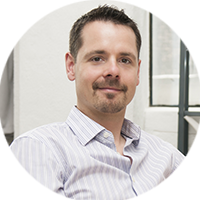
Commercialization Honoree: Max Perelman
Co-Founder & Business Lead of Biomeme
What inspired you to launch Biomeme nine years ago? Was there a specific market need you were trying to fill at the time?
My co-founders and I each have had different reasons for launching Biomeme.
Jesse vanWestrienen, who leads our biology team, had contracted both Dengue fever and Malaria (simultaneously!) while traveling in Southeast Asia. He was hospitalized and had significant challenges getting diagnosed at the time. Later on, he also conducted mosquito surveillance for regional authorities in New Mexico. These experiences drove us to develop decentralized diagnostics and real-time vector surveillance solutions which are now used globally for a wide range of tick-borne and mosquito-borne pathogens.
Marc DeJohn, who leads engineering, saw that smartphones were playing an increasing role in our personal healthcare and he wanted to transform a smartphone (iPhone 4 at the time) into a real-time PCR Thermocycler, to empower anyone anywhere with the capabilities of a molecular lab in the palm of their hand.
And for me, my two daughters were very young at the time and I was constantly frustrated by my pediatrician’s inability to provide accurate test results when I needed them. I wrote a blog post about it here. Then, when Marc mentioned all the amazing things we could do with mobile hand-held PCR, I was hooked and have never looked back!
How has Biomeme and your role within the organization evolved over the years?
My two co-founders are the technical geniuses behind our DNA/RNA extraction technology, shelf-stable tests, and mobile thermocyclers. My role has always been to build the business foundation to support these inventions and get them widely adopted globally. Until recently, I handled most non-technical areas: fund raising, marketing, business development, sales, account management, customer support, HR, legal, accounting, office management, and much more. The company phone and even the front door buzzer forwarded to my cell! As we’ve grown from 3 co-founders to over 260 employees and perhaps another 100 part-time/contractors, I’ve been able to hire subject matter experts which has been wonderful. It leaves me with more time to do the things I love: developing our business strategy, sharing my love of our products and the science with new clients, and assisting customers when they have challenges.
Biomeme experienced seismic growth during the pandemic because of the company's response to COVID with its rapid COVID-19 test and other diagnostic hardware. Can you talk about that pivot and what it was like to scale a company/grow a team under such extraordinary circumstances?
Scaling is never easy but it’s significantly more challenging when you make physical products that include hardware, software, biochemistry, as well as testing services across the US. Then layer on the complexity of this being a regulated human health industry. And finally inject the complexity of this all occurring during a global crisis.
Scaling during the pandemic has been so incredibly difficult. I remember at one point during a single week we had a total collapse of the global supply chain, riots and a burned out police car in front of our office, all deliveries/pickups cancelled, multiple staff sick with COVID, and I think there was even a tornado in Philly that week!? None of this would have been possible without our incredible team that has been going non-stop dealing with challenges while building a sustainable business. We’ve grown from approximately 30 people in Philadelphia pre-pandemic to 300+ team members across 8 cities.
Why was it important for you to help contribute to solving the problem in this way? What prompted you to take action?
Marc, Jesse, and I have always thought our mobile real-time PCR solutions were uniquely designed for decentralized diagnostics and real-time disease surveillance – essential capabilities during a global pandemic. The limited use of our technology during the 2014-2016 Ebola outbreak in West Africa led us to accelerate development of a full suite of global pandemic solutions. And, when COVID hit the United States, we were ready to deploy our solutions that are now widely used for rapid SARS-CoV-2 diagnostics and even wastewater surveillance.
Biomeme is a true Philadelphia success story having launched and grown in the city of brotherly love and benefiting from local resources like Ben Franklin, NextFab, PACT and our own Launch Lane Accelerator (fka Digital Health Accelerator). What would you say to those weary of Philadelphia's startup scene?
Biomeme has found Philadelphia to be a wonderful city in which to build its biotech business. A significant portion of our manufacturing and supply chain is located either in the city or the region. This has been incredibly important during the pandemic. The majority of our talented staff come from Philadelphia’s major universities and graduate programs. And the city itself is just a wonderful place to live with fantastic restaurants and (relatively) bike-friendly streets.
As a kid, what did you want to be when you grew up?
Brain surgeon in elementary school. Psychologist like my parents in middle school. Rabbi in early high school, followed by ceramicist. After that, I just focused less on a grand lifetime career and simply on what I wanted to do “next.”
Favorite thing about Philadelphia?
Philly’s BYOB scene.
What’s your superpower?
Treading water. It’s been a long year.
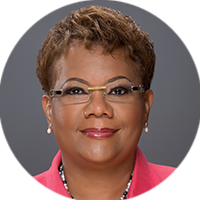
Capital Honoree: Della Clark
President of The Enterprise Center
You've been with The Enterprise Center for quite some time now. As the President you've had different vantage points of the organization. Can you talk about how your role – and The Enterprise Center itself – have evolved over the years?
I will celebrate thirty years with The Enterprise Center in January. When I started, the budget was around $31,000, and today's budget is $6.7 million, so that’s one of the stark differences! We were in our infancy stage as a nonprofit and as an organization. Our doors opened in January of 1990, and I came in as the second person to lead it in 1992 when we were still relatively new and trying to find our way as an organization. Personally, twenty-nine and a half years ago, I had to write, prepare, and go to the post office to mail our funding requests and applications because we didn’t have staff, whereas today I now have 45 staff and a management team, and we haven’t finished growing yet. I didn’t have all those things back then. Technological advances have also completely changed how The Enterprise Center does business and how I do business. We can reach clients digitally, virtually, and in-person, and expand our services using technology. The ability to grow and remain connected as a team using technology has kept us relevant with the speed of the business and capital markets, but as a nonprofit, staying relevant and even a step ahead of those markets is challenging and continues to affect how I lead today.
What have you found is (or are, if more than one) the biggest hurdle(s) or challenge(s) to providing capital and funding to underrepresented and minority entrepreneurs in our community?
The top hurdle of the capital markets is who can easily gain access to capital. If you were to take the same business plan and give one to a minority enterprise from a low-wealth, underserved community and the other to a business from a middle-upper class or a prosperous community, the acceleration and growth of those business plans would be fundamentally different.
For example, someone from a more prosperous community has a network of family and friends where they can probably aggregate $75,000- $100,000 to start their business. In a low-wealth community, you don’t have access to that same money, so you must take out loans. And by the time each business gets to a million dollars in revenue, their balance sheets will look fundamentally different, as well as their sales growth and the type of customers they have.
It boils down to the capital and that infusion of capital as you grow. It’s like an airplane that arrives at the airport and just keeps circling because they haven’t been given an “ok” from air controllers to land. Minority businesses start out with a certain amount of loans. That capital runs out because you leveraged all your assets on that first loan. The size of your business is now commensurate with another loan, so now you’re just circling and hoping you don’t run out of gas, and unfortunately, what happens all too often is they run out of gas.
The capital markets, or the people who control capital, are looking at these businesses like they should be traditional because that’s what they’re accustomed to looking at. There are inequities in capital that prohibit minority enterprises from scaling. One of the things The Enterprise Center is trying to focus on is becoming that capital investment center for minority enterprises because unless we really address the capital issue, we will always be a city with low wealth. The City of Philadelphia is one of the largest U.S. cities with one of the largest minority populations based on percentages, but it is not commensurate with the level of economic and investment activities of this city.
Why is The Enterprise Center’s success so vital to the success of our ecosystem?
There are many service providers in this city and region, but we’re the only one with minority enterprises as are our clients. There are other entities with minorities as their clients, but it’s not their sole purpose. So that puts a great deal of pressure on us to achieve these goals, move the needle, and be that model for the future. We have to be a very good intermediary and connector, not only for capital but also for procurement, contracts, and capacity building.
The last 18 months have undoubtedly dealt a blow to so many minority-owned businesses in our city. How have these events influenced The Enterprise Center's day-to-day operations and overall mission?
There have been good and bad changes as a result. It gave us time to be still because most of us were working from home, and it gave us an opportunity to really think collectively about The Enterprise Center’s work. We decided that the way in which we were operating prior to the pandemic isn’t the same approach we’d take post-pandemic.
As an example, before the pandemic, we were very heavy on funded programs. Now we have a different dialogue with funders. We’re interested in very specific projects that are highly customized to the pain points of our clients.
We’re focused on bridging the capital gap. In the minority community, programs have historically been built around group training and cohorts, putting more than one person in a room together. That’s not solving inequity in our business community because enterprises in the lower-wealth, underserved areas have more pain points than those in a prosperous community. If I’m sitting in a class with all food entrepreneurs, for example, and I have a credit score of 500 that’s keeping me from getting credit with my supplier or getting a loan, I’m not going to raise my hand in the class and tell everyone that. But in a one-on-one setting, business owners are more likely to open up.
Now the bad. We saw that many of our clients are in what we refer to as a “cash remittance” business, such as retail, food, coffee shops, and restaurants. They did not have sufficient cash reserves to weather this pandemic, so their capital needs have been significant. We’re looking at this customer segmentation differently coming out of the pandemic. We recognize that it’s not practical for those struggling businesses to close for a few hours and come to The Enterprise Center for help.
In response, we purchased an eight-passenger vehicle that we’re customizing to offer curbside business services on wheels. Starting this fall, we’ll be taking it out to these businesses. For example, during the PPP application period, we found many people didn't have scanners to help organize their documents. So, the vehicle will have a scanner, digital storage tools for businesses to organize their documents securely, and we will drive it around the city to different commercial corridors and even home businesses. Because we are a Community Development Financial Institution, businesses can apply for loans through our curbside business team, and we can close on your loan in our vehicle! We’re planning to partner and collaborate with the African-American Chamber, the Asian American Chamber, Mount Airy U.S.A, Beech, and other CDCs and organizations, so when we go to those different business corridors, we will have representatives that can help those business owners. Many other businesses have put their business on wheels: food, healthcare, but no one has ever done it for technical assistance.
What is your favorite thing about Philly?
It’s a big city, with a small-town feel. Everyone knows each other.
As a kid, what did you want to be when you grew up?
I didn’t have a particular industry in mind; I just knew I wanted to run something or lead. I always wanted to be the person in charge. I was that way even at home, and I always got in trouble with that!
What's your superpower?
My superpower is my faith. I’ve always believed that all you needed was the faith of a mustard seed. I take risks because I have faith associated with that risk, and I believe strongly in working hard and staying focused. Because I’ve been with The Enterprise Center for thirty years, you can see that I am not a “hopper.” Often when people are not finding success or things are not going their way, they move on to something else; I’m not that type of person. I have faith that if I stick to it, it will come to fruition. And I’m in it for the long gain, not the short gain.
I just want to add that I believe this is a real moment in America and Philadelphia to make significant changes in how we've done business and how we've looked at our city. I want The Enterprise Center to be part of that change as it relates to minority small businesses. We are stepping up in ways that we never imagined we would or could, and part of that was a new viewpoint from the pandemic and the killing of George Floyd.
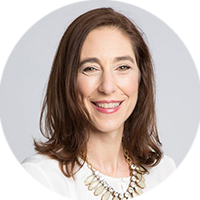
Cultivation Honoree: Tracey Welson-Rossman
Co-Founder of TechGirlz & CMO of Chariot Solutions
It’s clear there’s an opportunity for more women to occupy more seats in tech. What is the TechGirlz origin story and why did you target middle school as the time to inspire girls to pursue tech as a career path?
I started my career in tech with an accounting software company which then morphed into Chariot Solutions in 2002. I noticed there was a lack of women in the industry after a few years at Chariot. There was a lack of women in our recruiting pipeline.
I began to do some research and found that women were not matriculating into technology focused college programs. Two studies I found showed the drop off for girls not considering tech careers was in ninth grade. As I started looking at middle school, it just so happened that my children were in middle school at the time (I have two boys). Their friends who were girls were still into math and science. I felt middle school was where we should be focusing.
I put together a committee and we did some focus groups with girls and teachers to get a better understanding of the reasons for this waning interest. From that advisory group, we came up with what TechGirlz would become. Research showed that there was a lack of understanding of what a tech career looked like, and a lack of understanding of what people in tech look like.
We also want to make sure that not only did we talk about coding, but that we really showcased the breadth that technology was such as website design, cyber security, Photoshop, creating podcasts and so much more. Our first event was at the Science Center, who has been a true partner to TechGirlz from the get-go. That first event, at Quorum (when it was 3711 Market Street), had presentations from different people in tech, like the founder of ModCloth, Dr. Frank Lee of Drexel talked about gaming, Gloria Bell a social media expert, and a woman who had co-founded a tech startup, who was very pregnant at that time. So we really showed the variety of what people looked like.
When we first started, I thought we would be
lucky if five girls attended - we
started with twenty-six. We did five more events that first school year. By the
next school year, our first event had a waitlist of fifty girls. What I discovered
after the first event was that I became the de-facto expert on girls in tech.
This showed me how open the market was and how much of a need there was for
what we were doing.
What were some of the biggest challenges you faced in getting TechGirlz up and running?
I wanted to treat TechGirlz like any startup. You’re challenged with lack of finances, getting the word out, the marketing, making sure you’re creating a product that people want, understanding who your customers were, and creating an organizational structure. The only difference was that we were a nonprofit. We got our 501(c)3 in under six months so it went from zero to sixty pretty quickly.
Why is Philadelphia uniquely positioned to
lead the way in women pursuing tech careers? Beyond TechGirlz what other
resources does the city have to offer? What more do we need?
I believe that no other region would have fostered what we developed. As people learned what we were doing with TechGirlz, I never heard “no” when we asked for help.
We got to a point in our second year where we had volunteers running our workshops to help us expand the number of girls we could work with. We quickly involved, institutions and companies like Drexel, Comcast, Bentley Systems found financial support from foundations like Lenfest Foundation. Individuals from the developer community came in too and were always supportive. Individuals were generous with small amounts of money. As much as Philadelphians get negative press about the way we may be “gruff,” what I know is that TechGirlz would not be here without the Philly tech community and the business community.
On the flipside, as much as we had support, we did need more money. From a nonprofit standpoint, there’s always difficulty in fundraising. We ran very lean out of necessity. I would say there’s a lack of understanding of the resources and time needed to get from point A to point B in educating. Whether it’s middle school girls finding their way and understanding that they belong, or it’s somebody who is changing careers from a lower skill position, there’s a good amount of time that it takes to become a skilled technologist. We need more investment, and we need more flexible metrics as to what success looks like.
When TechGirlz was acquired by Creating IT Futures two and half years ago, we had seven employees. I cannot have had this success without a team of people who bought into the vision and were as passionate as I was about the mission.
It takes a village. We had the parents who were committed to their girls having this type of opportunity, the volunteers, the businesses, our staff, people (like my mom) who sent me articles - so many people who were looking out for the wellbeing of our group; that’s always been amazing to me.
What are you most proud of when it comes to TechGirlz and what you have been able to achieve in the past twelve years?
First, I’m so proud that we’ve been able to have so many girls, not just in Philadelphia but across the country, who have learned to think differently about what their abilities could be and what they could do. Sometimes you just need somebody to tell you, “you can do this” and believe that you can do it.
Second, I’m so proud that we created a sustainable organization that lives past my tenure. The ten-year mark was when management changed hands and we were headed towards [having served] 25,000 girls. When the pandemic hit a little over a year after we changed hands, the TechGirlz team (led by Amy Cliett) changed over to virtual programming, and they’re now able to reach even more girls and secure more volunteers.
I’m also proud that I was able to express the need for what we were doing. Right now, it’s common to have these discussions around more diversity in the tech workforce. But twelve years ago, it was considered a bit cutting edge. I’m glad that I was able to play at least a part in bringing it to the forefront in a way that was positive.
What is your favorite thing about
Philadelphia?
I love Philadelphia. I’m born and bred. I love our music scene, the culture, what’s going on in the restaurants, being able to walk and get around so easily. And the region itself, there’s just so much to it. There’s just so much to do here. What’s also great is how new people can come here and start new things, with new perspectives, and they’re accepted. And I’ve heard from people in other cities that’s not always the case.
What did you want to be when you grew up?
I wanted to be Jane Goodall but then I understood that monkeys were not pets so that went to the side and I wasn’t sure I wanted to be out in the wild for long periods of time. I did a 180 and went into fashion and now I’m here, starting a new company. Life takes unexpected turns.
What is your superpower?
My superpower is to take an idea and execute it. I’ve done that many times. I have a tendency to hang around people who also get stuff done. When you build that type of community, I would also call that a super-power: finding those likeminded individuals.
And one last note - I know that this is a women’s organization, but we’ve had a lot of men who have been important to its growth and sustainability, and the three men I would really like to give a shout-out to are my husband and my two boys because they shared me when I would have to go out on a Saturday or evening and do events. They were also part of running the company. Both my kids worked for TechGirlz at some point in their journey to where they are now, and my husband has just been so supportive. Chariot Solutions and their CEO also deserves thanks for giving me the leeway to do the work and never questioning the value of it.
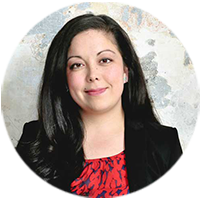
Convene Honoree: Michelle Freeman
CEO of Witty Gritty
You’ve dedicated your career to connecting people and communities through experiences and engagements. How did the last 18 months change your perception of the concept of connection, and how will it influence your work post-pandemic?
One major thing that’s clear to me is that even though the pandemic was a challenge for everyone, in terms of looking at what community engagement looks like. We were moving so quickly before the pandemic. It’s not about checking the boxes – having the community meeting, seeing who shows up. But rather asking ourselves, “who’s missing from the conversation?”
The pandemic removed our ability to meet in person and we had to disconnect the idea of community engagement with events. We had to ask ourselves, “if we can’t be in person, then what do we do?”. Not just virtual events, but really understanding where people are at taking into consideration other things happening in their lives.
There’s a need to go back to basics. We were all so busy running around pre-pandemic and what we learned to do over the last 18 months is take the time to really connect with and understand people.
For example, when there's an event taking place, all energy goes into hyping it, but at the end of the day it’s to raise awareness of an organization and its work. The pandemic enabled us to get back to basics, and really connect with the stories and goals of the organizations we support. The experience gave us pause to be even more intentional about how we’re working with clients and challenging them to think about those goals.
Beyond that, we inadvertently became pretend TV producers giving us more tools in our toolbox to create better, more accessible experiences.
What was the genesis of Witty Gritty and how as the company evolved since it started?
I worked for Campus Philly for 8 years with the founding Director getting it up and running. That experience at Campus Philly helped set a path for what I was interested in pursuing: civic-focused, economic development, and talent retention work.
I wasn’t necessarily intending to build a company, it was really out of necessity – when things became busy, I needed more people.
While I was building Witty Gritty I also helped run an online publication, Flying Kite, which helped anchor the concept of storytelling as part of what we do. It really helped us take our abilities as event planners and expertise in logistics and merge it with storytelling and journalism.
That storytelling thread has really become a through-line in a lot of the work we do because of how content heavy it is. What a speaker at an event says in their remarks impacts how the attendees will identify with it. On the marketing side, if we’re building promo campaigns, that’s related to storytelling to connect with people more deeply and makes it less transactional.
We’re still small and always talking about how best to evolve, grow, and challenge ourselves. Looking ahead, one of the areas we want to make more space for is larger initiative building like Amplify Philly where we co-lead and co-produce.
We live in a time of exceptional political and ideological divide. That polarization is often the result of a lack of understanding, empathy, and exposure. How are initiatives like Urban Consulate, TEDxPhiladelphia, and even Amplify Philly helping to bridge that divide?
Urban Consulate and other projects we work with are anchored in listening and connecting people. We’re focused on space-creating, where we’re developing intentional, thoughtful space for people to have conversations with each other.
And it’s not just us. We’re plugged into a national network where we can connect with other people from other cities. That shift from micro to macro shows us that we’re not all that different. Some of the conversation topics and themes created particularly through Urban Consulate, are complicated and challenging particularly with everything that’s happened over the last year and half. It’s all about the intentionality of creating the space. Not everything needs a task force or a working group. Sometimes just having a conversation is enough to shift a perspective.
It can lead people to realize that just because they may not share an opinion with someone, doesn’t mean they don’t have anything in common.
In terms of Amplify Philly, we’re focused on the intersection of sectors. We’re focused on growing and deepening that intersection as a convener to create that dialog and showcase it on a national and global platform.
What are you most proud of in your career?
We’ve built a community and space that has served as stepping stone for people both internally and externally.
Many current and former Witty Gritty team members have other entrepreneurial pursuits and our event and project staff are often gig workers or are sometimes between jobs. So if we can help them with their next thing in life, I see that as less transactional as it is community building.
Externally, our clients and partners are looking for a soft place to land when they’re trying to get something done. We’ve been able to help them achieve those goals by being intentional in our work.
What it comes down to is that I’m most proud that we’ve been able to walk the walk and we’ve realized looking back that we’ve been doing it all along.
Favorite thing about Philadelphia?
I love the neighborhood I live in (South Philly) because I have access to any cuisine imaginable. It makes me spoiled, but happy.
As a kid, what did you want to be when you grew up?
I wanted to be a rockstar. But I suppose if I didn’t do this job, I would’ve been a detective or forensics scientist.
What is your super power?
Karaoke.


